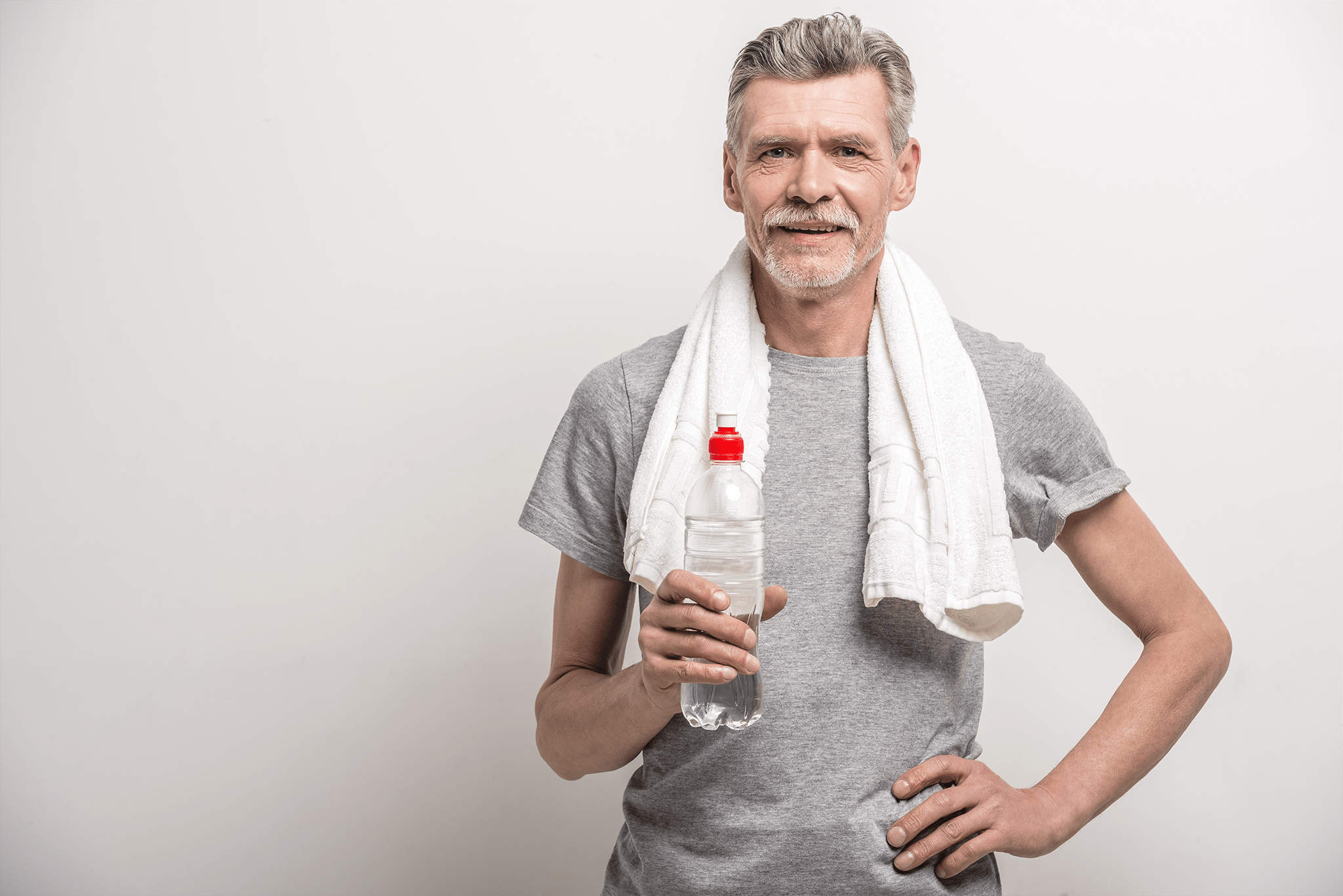A fitness program can negate many of the adverse effects of other risk factors, such as smoking, high blood pressure and high blood sugar. The more frequent the exercise, the greater the benefit. This overriding effect of fitness and its apparent effect as a remedy for various chronic diseases makes physical fitness among the most important things an aging person can do to remain healthy. If you are at risk because of certain genetics or habits you cannot change, getting in good physical shape is a valuable step you can take to keep yourself alive longer. A physically active life may allow you to approach your true biogenetic potential for longevity.
Reasons to Exercise
Physical activity can make a major difference in the risk of many aging-related diseases, including:
- Coronary heart disease
- High blood pressure
- Colon and rectal cancer
- Breast cancer survival
- Diabetes and related problems
- Arthritis
- Osteoporosis
- Falls and balance

Want to cut back on trips to the doctor and stay out of the hospital? You may want to start spending more time at the gym. A study reported in the December, 2004, in the issue of the Journal Medicine & Science in Sports & Exercise shows that physically fit men visit their doctors less often and are less likely to require an overnight hospital stay. “Fit men, as well as those who become fit, may reduce health care costs by more than 50%,” says researcher Tedd L. Mitchell, MD, of the Cooper Clinic in Dallas.
Another study published in the journal Circulation, March 2004, suggests that regular exercise might slow the progression of mild to moderate coronary heart disease and reduce coronary risk even better than angioplasty. Moreover, the exercisers in the study experienced fewer cardiovascular events, including heart attack, stroke, and hospitalization for worsening angina.
For men, better physical fitness may mean better sex. Harvard researchers concluded that frequent exercise can reduce the risk of erectile dysfunction in older men. They found a 30 percent reduction in the risk of erectile dysfunction in those who exercised vigorously – the equivalent of running at least three hours a week – compared with those who exercise very little or not at all.
Benefits of a Fitness Program
In addition to reducing the risk of death and improving strength, exercise improves mood and reduces the impact of other health risks. Exercise can make your heart stronger, improve circulation, lower LDL and raise HDL cholesterol levels, reduce body fat, lower blood pressure, decrease the risk for cancer of the breast, colon, prostate and endometrium, help prevent adult onset diabetes and osteoporosis, plus exercise increases back strength and mobility. Breast cancer survivors have a 20-54% lower risk of dying, depending on the amount of exercise they do. However, keep this in mind: you have to use it, or risk losing it. In order to reap the benefits of physical fitness, you not only need to get into shape – you must stay in shape. Physical activity must be maintained for a lifetime. The substantial protective effect of continued physical activity persists even to advanced old age. Exercise keeps you young only as long as you keep doing it.
Exercising regularly ensures that the body is in a constant state of cellular regeneration. This continual regeneration promotes the production and release of important hormones such as growth hormone and testosterone. Exercise promotes balance in all hormones, improves cellular hormone communication and cellular sensitivity to hormones. For example, diabetics see improvements in sensitivity to insulin with exercise. Similarly, the effectiveness of all hormones improves with exercise.
Mindful Exercise
Elite athletes don’t rely solely on physical training, genetics or coaches to get them to the top. They include rigorous psychological exercises for mental preparation. “When physical skills are evenly matched – as they tend to be in competitive sport – the competitor with greater control over his or her mind will usually emerge as the victor,” says Steve Backley, Olympic athlete in his book The Winning Mind. The move from average to better-than-average requires mindfulness; focused attention and clear intention in all actions.
Mindful exercise is about connecting your mind and body. Use your mind to listen to what your body is telling you during exercise. Diverting your attention by watching the television or reading while exercising prevents full and complete attention to your workout. It may be helpful to have some background music, but it should not be where your mind is focused. Here are a few ways to create a mindful approach to exercise in your life:
- Focus on the here and now. If your mind is elsewhere, you are missing a significant opportunity to realize maximum gains. Be in the moment. Be in your body. Begin by focusing on your breathing first, then your posture. Assess your form and technique, particularly when you begin to tire or feel fatigued. Listen to and feel your heart beat. Notice how your muscles, tendons and joints feel with each workout.
- Learn to relax. Use self-talk to tell yourself to “Be calm.” Practice relaxation techniques during recovery. Breathing techniques are among the most valuable. Tense, tight muscles will fatigue you more quickly, cause avoidable pain, and minimize your efficiency.
- Adjust your attitude. An attitude that is not open and accepting, or that is filled with judgment, places obstacles in your way.
Starting to Exercise
Consider whether you need a pre-exercise medical exam. If you have chronic health problems or you are over the age of 50 and have not been exercising regularly, get medical clearance before starting an exercise program.
- Start slowly. Don’t overdo it. If you have not exercised in a while, just go for 5 to 15 minutes at the beginning.
- Do a little more each week. Try to build your workout by a couple of minutes each week. Aim to increase the duration of your workout by 10% a week.
- Warm up first, then stretch, and stretch again after your exercise.
- Imagine yourself doing your sport or activity. Make a picture in your mind of lifting the barbell with perfect technique or running in perfect form. Imagine how your body would move.
- Learn to listen to your body, and treat yourself right. If it hurts, slow down. If it feels good, do more than you planned.
- Take a lesson. Even if you don’t normally work out with a trainer or a pro, treat yourself to an hour or two with an expert who can show you how to maximize your workout and avoid needless injuries.
- Cross-train. Try to plan your workout schedule around a number of different activities, such as walking, biking, and swimming. Rotate your activities on different days. Vary the exercise pattern. Avoid doing the same activity every single day, and certainly not more than two days in a row.
- Vary your workout pace. Do more on some days and less on others.
- Don’t let yourself get dehydrated. Drink water. Every 10-15 minutes, take a break and drink half a cup or more of water.
- Exercise with a friend. You’ll encourage each other and push yourselves to meet your goals.
- Use an Exercise Log. This will become one of your most useful tools for achieving maximum results for your effort. Studies demonstrate that exercisers who regularly log workouts are more successful and much more likely to stick with an exercise program. A log is a fantastic feedback tool; measurable progress is a great motivator. An exercise log is meant to document your exercise program, problems and progress. Even if you work with a personal trainer, remember that only you are responsible for yourself. It
- Set goals and when you achieve them, treat yourself. Buy a new pair of shoes or get a massage.
- Celebrate your age reduction!
For extensive information on how to get started with Optimal Fitness, please ask Dr. Zakany for a copy of Living Younger by Dr. Gregory Petersburg and he will be glad to share the book with you.
(©Gregory W. Petersburg, D.O. All rights reserved. Living Younger, pp. 99-129.)
Live. Your. Life.
Don’t let age run your life. Choose your path and create the happiness you deserve!
Get in Touch!
2770 Dagny Way, Suite #109
Lafayette, CO
80026
Tel: (303)666-1199
Email: [email protected]
